- Home
- John Berger
To the Wedding Page 2
To the Wedding Read online
Page 2
Still listening to the nocturne in the room on the fifth floor, Zdena closes the curtains and goes over to a wall mirror by a blue and white tiled stove. She gazes into the mirror.
What really happened that evening ten years ago when she asked Jean about the visa? Had they agreed, like people possessed, like the mad, that the three of them would never again know the same place as home?
How do we decide things?
Stuck into the bottom corner of the mirror is a bus ticket: Bratislava-Venice. She fingers the ticket with her left hand, the one whose fingers ache.
The motorbike has a blanket draped over its saddle. On the blanket three cats are asleep.
Jean Ferrero comes down the staircase into the kitchen wearing his boots and black leathers. Opening a trap at the bottom of the backdoor he claps his hands and, one after another, the cats jump down from the bike and slip out into the garden. He made the trap fifteen years ago when Ninon had a puppy she called Majestic.
Then I heard the voice which had reminded me of the slices of a melon. The same voice but belonging now to a girl of eight or nine. She says: Majestic is under my jacket as I walk past our railway station. Sixty-one trains pass through our station every twenty-four hours. Everything sent as freight to Italy goes through our tunnel. I carry him under my jacket and he rests his chin on my top button and flaps his ears against the lapels. If I don’t count the snails, the worms, the caterpillars, the tadpoles, the ladybirds and the crayfish, he is my first pet. I call him Majestic because he is so small.
Jean opens the street door, gets astride the bike and pushes with his feet. As soon as the back wheel is over the doorstep the bike rolls by itself out into the road. He looks up at the sky. No stars. Blackness, a visible blackness.
I walk past the railway station with Majestic in my jacket and everybody stops and points with their fingers and smiles. Those who know us and those who don’t. He is a new creature. Monsieur le Curé asks me his name as if he were going to arrange a baptism! Majestic! I tell him.
The railwayman goes to lock up his house. He turns the key in the door as if the act of turning it is already an assurance that he will be back next week. The way he does things with his hands inspires confidence. He is one of those men for whom manual gestures are more trustworthy than words. He pulls on his gloves, starts the engine, glances at the petrol gauge, taps down to first, lets out the clutch and glides off.
The traffic lights by the railway station are red. Jean Ferrero waits for them to change. There is no other traffic. He could easily slip across without any risk. But he has been a signalman all his life and he waits.
When Majestic was seven, he was run over by a lorry. From the first day when I fetched him and he rested his chin over my top button and I carried him home under my jacket, saying, Majestic, my Majestic, he was a mystery.
The light turns green and as man and bike gather speed, Jean lets his booted right foot trail behind, whilst with the toe of his left he taps up into second, and, by the time he reaches the telephone boxes, up again into third.
I saw it yesterday, hanging in a shop window next to the Hôtel du Commerce, that dress has my name NINON on it! All the body black Chinese silk with scattered white flowers. Just the right length, three fingers above the knees. V-neck with long lapels, cut, not sewn. Buttons all the way down. Against the light it lets a little through, but not enough to be blatant. Silk is always cool. If I dangle it up and down, my thigh will lick it like an ice cream. I’ll find a silver belt, a wide silvery belt to go with it.
The motorbike with its headlight zigzags up the mountain. From time to time it disappears behind escarpments and rocks and all the while it is climbing and becoming smaller. Now its light is flickering like the flame of a small votive candle against an immense face of stone.
For him it’s different. He is burrowing through the darkness like a mole through the earth, the beam of his light boring the tunnel and the tunnel twisting as the road turns to avoid boulders and to climb. When he turns his head to glance back—as he has just done—there is nothing behind except his taillight and an immense darkness. He’s gripping the petrol tank with his knees. Each corner, as man and machine enter it, receives them and hoicks them up. They come in slow and they leave fast. As they come in, they lie over as much as they can, they wait for the corner to give them its camber, and then they leap away.
Meanwhile, what they are climbing through is becoming more and more desolate. In the blackness the desolation is invisible but the signalman can feel it in the air and in the sounds. He has opened his visor again. The air is thin, chill, damp. The noise of his engine thrown back by the rocks is jagged.
During the first year of my blindness, the worst recurring moment was waking up in the morning. The lack of light on the frontier between sleep and being awake often made me want to scream. Slowly I became accustomed to it. Now when I wake up, the first thing I do is to touch something. My own body, the sheet, the leaves carved in wood on the headboard of my bed.
When I woke up in my room the next day I touched the chair with my clothes on it, and again I heard Ninon’s voice as sharply as if she had climbed up a ladder from the street and was sitting on the windowsill. No longer a child, not quite a woman.
Today—the first flight of my life. I loved it above the clouds. Where there’s nothing to stand on, I could feel God everywhere. Papa took me on the bike to the airport at Lyon. First hop over the Alps to Vienna. Second hop to Bratislava. And here I am in the city whose name I only knew as a postmark or as part of her address. The river Danube is beautiful and the buildings along it too. Maman was at the airport. She looked prettier than I thought. And I’d forgotten how beautiful her voice is. I’m sure men fall in love with her voice. She was wearing her wedding ring. The flat on the fifth floor has high ceilings, tall windows and furniture with thin legs. A flat made for long talks. All the drawers are full of papers. I looked! To get to my room I go out on to the landing by the staircase and open another front door with a key. I think this room belonged once to another flat. Maman says something about “a shameful story of informers” and I’m not sure what she means. I like my room. There’s a big tree outside the window. What kind of tree? You should know that, she says in her beautiful voice, it’s an acacia. Best of all, there’s a pick-up so I can play my cassettes.
Three days without a note. I must be enjoying myself.
Went for a long walk in the forest looking for mushrooms. I found some éperviers. Maman didn’t know about éperviers—she thought they were only birds!—so I said I’d cook them for us. If you don’t know how, they can taste very bitter. We ate them in an omelette.
She asks questions all the while. What am I going to do after my Bac? Have I many friends? What do I want to study? What do they want to study? What about foreign languages? What would I say to learning Russian? In the end I tell her I’d like to learn to be an acrobat! Straightaway she answers: There’s a very good school for circus artists in Prague, I’ll make enquiries. I kiss her because she doesn’t see I was joking.
Sunday lunch in a restaurant on the Danube. Before we went swimming. She bought me a costume yesterday. Black. Quite sexy. She told me that a few years ago she swam across the Danube at night—it’s forbidden—to prove she was still young! By herself? No, she replied but she didn’t say anything more. Her costume is black and yellow like a bee.
The Pope is visiting Poland, and all during lunch Maman talks about what’s happening there. Lech Walesa is in hiding and his trade union has been outlawed. Solidarność, as Papa calls it. The old General, according to Maman, the one whose name begins with a J, has fewer and fewer choices, he’ll have to negotiate with Walesa even if he doesn’t want to. The old guard are finished, she whispers. We both have a second ice cream. The Brezhnevs and Husáks can’t last, they’ll go, swept aside. Do you know what the people in the street call our President?—she bends very close to my ear—they call him the President of Oblivion!
Maman has
two daughters! That’s what I’ve learnt. I have a sister. Maman loves us both. My sister’s called Social Justice. Justie, for short. She’s writing a book, Maman. It’s called “A Dictionary of Political Terms and Their Usage, 1947 Till Today.” The first entries are Abstention, Activist, Agent Provocateur … When she says these words, they sound like love words. She has a lover, I think. A man called Anton telephones and she talks to him—I can’t understand anything except when she says my name—she talks to him with a voice like a cat’s tongue, tiny and warm and raspy. I asked her and she said Anton wants to take us into the country. We’ll see. Her book is all about my sister. She’s plainer than I am. But worthier. They’ve got as far as the letter I. Idealism, Ideology. Soon she’ll be on to the Ks. In the restaurant we’re drinking coffee when an orchestra files in, tunes up and starts to play. Tchaikovsky! Maman hisses. A disgrace! For Czechs it’s a disgrace! We have our own composers. I ask her if she knows the Doors? She shakes her head. Jim Morrison then? No, tell me about him, you must tell me. I recite in my poor English:
Strange days have found us,
Strange days have tracked us down.
They’re going to destroy
Our casual joys.
We shall go on playing
Or find a new town …
Say it to me again, slowly, Maman asks. So I do. And she sits there gazing at me. After a silence she says something I immediately wanted to write in my diary. You’ll never have, she says, all of you, the future for which we sacrificed everything! I felt so close to her at that moment, closer than my sister ever is. Afterwards, in the tram, we cried a little on each other’s shoulders and she touched my ear, fingering it—like the boys at school try to do.
The roar of a waterfall. Jean, the signalman, has left his bike on the mountain road, its two headlights still burning, and he is picking his way across a kind of shore of stones. The waterfall is behind him. On the shore there are many boulders, some as small as him, others much larger, which have fallen from the peaks. Perhaps yesterday, perhaps a hundred years ago. Everything is stone, and everything speaks of a time which is not ours, a time which touches eternity but can’t get back inside it. Perhaps this is why Jean Ferrero left his headlights on. The crags and mountains around the shore are lit up by a pale light, the stars are fading. In the east, towards which he is walking, the sky is the colour of a dressing over a wound which bleeds. He appears totally alone in the vastness which surrounds him, but this may be more evident to me than it is to him.
A mountain is as indescribable as a man, so men give mountains names: Ovarda. Civriari. Orsiera. Giamarella. Viso. Each day the mountains are in the same place. Often they disappear. Sometimes they seem near, sometimes far. But they are always in the same place. Their wives and husbands are water and wind. On another planet the wives and husbands of mountains may be only helium and heat.
He stops and squats before a boulder, whose southern side is covered with lichen. It is the south winds from the Sahara which bring rain here. They gather clouds of vapour as they cross the Mediterranean, and these condense to make rain when they touch the cold mountains.
He’s looking, as he squats, into a pool of water beneath the boulder. The pool is the size of a washbasin. A current of water flows into it from under the rocks and, on the side where he is squatting, overflows into a gulley, which captures the little stream no larger than the width of two fingers. In the depths of the pool the tiny current is as continuous as the roar of the waterfall and he is staring at it. Its rippling waves are like those of hair and their curling is the only soft, unbroken thing to be imagined here among the jagged mountains at daybreak. He changes position and kneels on his knees, head bowed. Abruptly he puts a hand into the basin and splashes a handful of the icy water over his face. The shock of the cold stops his tears.
When I take the train with Papa, he talks railway talk. When I’m alone, I see soldiers. I know why. Ever since the History Prof, told us about the accident that took place in 1917, I’ve seen them. When the train’s empty, like this morning, they are there. The ticket collector just came in and said: Ah, Miss Ninon, so this term you’re going to take your Bac! Now he’s gone and all I see on this fucking train are the soldiers.
Not officers, common soldiers. Young men like the ones I talk to in the Tout Va Bien Café. The train is packed with them, with their rifles and their haversacks. A long train packed with soldiers can change history, Papa says.
My soldiers, they’re happy, it’s nearly Christmas, the twelfth of December, they’ve left the front line and they are going home. They’ve come through our tunnel. They waited a long time in Modane. Why Are We Waiting?, they began to sing. The engine driver didn’t want to take the train down to Maurienne with only one locomotive and with ice on the tracks. But the commanding officer ordered him to do so.
The coaches are rolling down to the plain full of soldiers going home on leave and I’m with them. I’d give a lot not to be. I know the tragedy by heart, yet I can’t take this line without seeing them. Every time I take the train I ride down with the soldiers.
Out of the window I can see the other track, the river and the road. Our valley is so narrow the three have to run side by side. All they can do is to change positions. The road can take a bridge over the railway. The river can go under the road. The railway can run over them both. Always the railway, the river and the road, and for me in the train, the soldiers.
They pass their bottles of pinard in front of me. The train is without lights but somebody has brought a hurricane lamp. One of them closes his eyes as he sings. By the window there’s an accordion player. The locomotive starts to whistle, as shrill and high as a circular saw cutting into wood. Nobody stops singing. Nobody doubts for an instant that they’re going home to fuck with their wives and see their children. No one is frightened of anything.
Now the train is going too fast, sparks are flying from the wheels into the night and the coach is lurching dangerously from side to side. They stop singing. They eye one another. Then they lower their heads. A man with red hair says between his teeth: We have to jump! His friends hold him back from the door. If you don’t want to die, jump! The man with red hair breaks free, gets the door open and jumps. To his death.
The wheels of trains are very close together under the coaches, closer than you’d ever guess, tucked right under, so the weight of the men being thrown around is making the coach lurch more and more violently. Stand in the centre, shouts a corporal. Keep in the fucking centre! The soldiers try. They try to move away from the windows and doors and they put their arms round each other standing in the centre of the train, as it hurtles towards the corner by the paper factory.
For a railway it’s a sharp bend by the paper factory with a high brick escarpment. I’ve often looked at it from the road. Today there’s no sign of the accident but the bricks make me think of blood.
The first uncoupled coaches derail and hurtle into the wall. The next coaches telescope into the first. The last ones leap on top, wheels grinding on to roofs and skulls. A hurricane lamp spills and the wood and the kit bags and the wooden seats of the coaches catch fire. In the crash that night eight hundred die. Fifty survive. I don’t die of course.
I was at the memorial service held for them at Maurienne sixty years later. I went with the Widow Bosson who used to make dresses for me when I was little. A few old survivors from the crash came from Paris. They stood close together, like the Corporal told them to do in the train. The Widow Bosson and I were looking for a man with one leg. And there he was! The Widow Bosson squeezed my hand, left me and edged her way over towards him. I knew what she was going to do, she had told me. She was going to ask him whether he had ever married? And, if he had, whether he was now a widower? I thought she shouldn’t do this. I had told her so. But I was only a kid and, according to her, I hadn’t yet learnt how hard life could be.
The Widow Bosson was fifteen on the night of the accident. The whole town of St-Jean-de-Maurienne was
awakened by the noise, and hundreds of people rushed to the wreckage, guided by the flames. There was little they could do. Some soldiers who were still alive were pinioned under the iron debris, trapped in the fire. One soldier begged the bystanders to take his rifle and shoot him! Another spotted the fifteen-year-old who was to become Madame Bosson. Angel, he pleaded, fetch an axe quick! She ran home, found one, and came running back with it. Now get my leg chopped off! he ordered her. The heat of the flames was infernal. Somebody did it. Sixty years later the Widow Bosson half hoped to marry the one-legged man whose life she’d saved that night.
From the station at St-Jean-de-Maurienne to the Lycée is a few minutes’ walk. I take my time, and as I walk, I tell myself: I want to leave this murderous fucking valley, I want to see the world!
Blindness is like the cinema, because its eyes are not either side of a nose but wherever the story demands.
On a corner where the No. 11 stops, the woman driver of the first tram of the day smiles at the smell of newly baked bread which she breathes in because she has jammed the tram windscreen open with one of her shoes. Five floors up, Zdena smells the same bread. The window of her room is open. Long and narrow, so narrow that a single bed arranged lengthwise barely leaves enough space to walk between the bed and wall, the room is like a long corridor leading to the window which gives on to an acacia tree and looks down on the tramlines.
Ever since her daughter’s visit, Zdena has called this “corridor” Ninon’s room. From time to time she comes here to look for a book. Whilst looking for one, she picks up another. A book by a poet who was once her lover. Or the letters of Marina Tsvetayeva. Then she sits down in a chair to finish reading what she has begun. And when this happens, when she stays in the corridor room for an hour or so, it is as if she can see Ninon’s dressing gown still hanging from the hook on the door.

 Once in Europa
Once in Europa To the Wedding
To the Wedding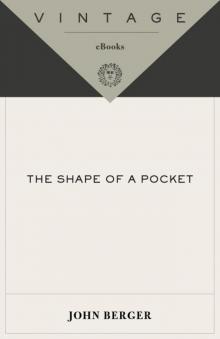 The Shape of a Pocket
The Shape of a Pocket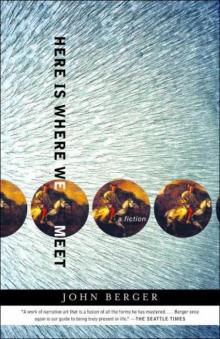 Here Is Where We Meet
Here Is Where We Meet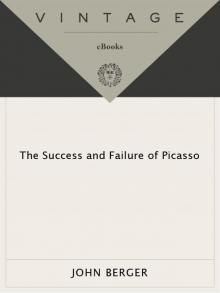 The Success and Failure of Picasso
The Success and Failure of Picasso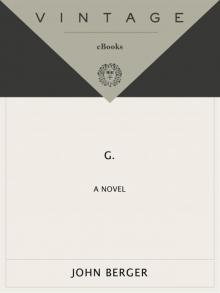 G.
G. Photocopies: Encounters
Photocopies: Encounters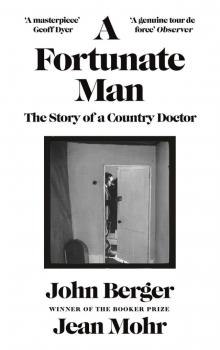 A Fortunate Man: The Story of a Country Doctor
A Fortunate Man: The Story of a Country Doctor And Our Faces, My Heart, Brief as Photos
And Our Faces, My Heart, Brief as Photos Titian
Titian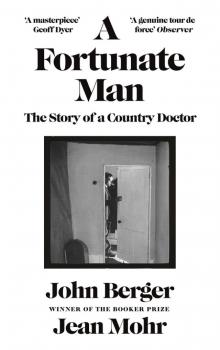 A Fortunate Man
A Fortunate Man Photocopies: Encounters (Vintage International)
Photocopies: Encounters (Vintage International) Selected Essays of John Berger
Selected Essays of John Berger